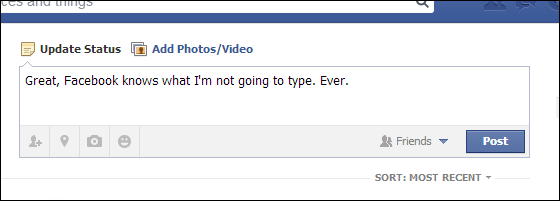Facebook, as we know, is the world’s foremost social network, with well over one billion active users gracing its service via mobile, Web, and other such mediums. With so many logging in at any one time, Facebook plays host to billions of messages and status updates every month, and although we can readily delete them from public view should we so wish, it’s common knowledge that what is removed doesn’t necessarily disappear for good. But what of the utterances we write, but don’t necessarily publish to the world – are they stored in Facebook’s vast cauldron of personal information? Well yes – yes they are.
Just like in your favorite email app, when you half-write a message, lose your page but can still recover the text through the drafts folder, Facebook utilizes a similar technique to store much of what you write, but for whatever reason, don’t opt to publish.

With most people’s Timelines littered with opinion, it’s often tempting to chime in with a few of our own, but often, after a little careful consideration prior to hitting that Post button, we change our minds. You may have presumed, naturally, that your comments would never be seen again, and the chances are, the entire notion of writing said message will probably have disappeared from your mind after a while. This makes it even more disconcerting, perhaps, that Facebook probably still has it written down somewhere under your name.
This collection of information has been discovered by Sauvik Das, a Ph.D. student at Carnegie Mellon and summer software engineer intern at the Menlo Park social network, and Facebook Data Scientist Adam Kramer. The study, which looks at this "self censorship" behavior whereby users often change their minds on what their planning to say, looked at 5 million English-speaking Facebook users.

As it transpires, it is a code in your browser, not anything specifically in Facebook’s end, which allows the social company to grab all of this data from you. Nevertheless, it’s still rather unnerving to learn that what you do, and what you don’t post to Facebook is still being logged, and that our self-moderation of content we opt not to share could still be lurking in cyberspace.
(Source: Slate)
You may also like to check out:
You can follow us on Twitter, add us to your circle on Google+ or like our Facebook page to keep yourself updated on all the latest from Microsoft, Google, Apple and the Web.

